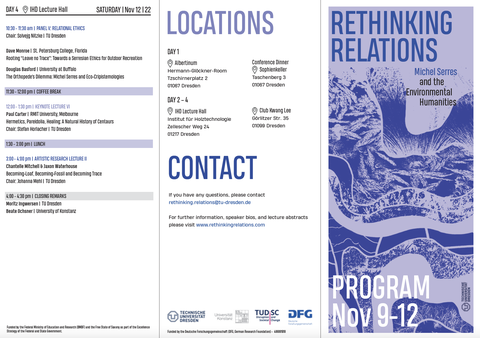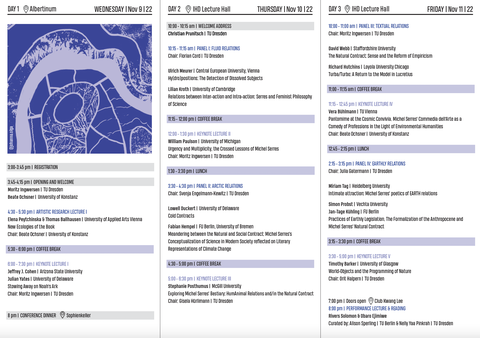Rethinking Relations: Michel Serres and the Environmental Humanities
November 9-12, 2022. TU Dresden.
An international conference organized in collaboration with Beate Ochsner (Media Studies, University of Konstanz).
Edited Volume in Preparation: Michel Serres and the Environmental Humanities (eds. Moritz Ingwersen, Beate Ochsner, Stephanie Posthumus), currently in preparation for Bloomsbury Press Series "Michel Serres and Material Futures."
Keynote Speakers:
Timothy Barker (University of Glasgow), Vera Bühlmann (TU Vienna), Paul Carter (RMIT, Melbourne), Jeffrey J. Cohen (Arizona State University), William Paulson (University of Michigan), Stephanie Posthumus (McGill University), Julian Yates (University of Delaware)
This conference is dedicated to dialogues between the environmental humanities and the boundary-defying philosophical thinking of Michel Serres (1930-2019). At least since the English translations of key texts in Hermes: Literature, Science, Philosophy (1982), The Parasite (1982), The Natural Contract (1990), Genesis (1997), The Troubadour of Knowledge (1997), or The Birth of Physics (2000), Serres’ poetic and transgressive exploration of interdisciplinary borderlands and confluences has been recognized as foundational for emerging fields such as literature and science, the posthumanities, science and technology studies, and media ecology. Effortlessly interweaving philosophy of science with literature, myth, geography, history, meteorology, politics, media, and art, his work is mercurial in the best of ways: “We have to imagine a foundation with wings on its feet!” (Conversations). With a penchant for the poietic processes of the natural world, the baseline of his thinking is an appreciation of complexity, of the ways in which contingency generates newness modelled on the turbulent dynamics of oceans, storms, rivers, flames, clouds, atoms, tectonic plates, and animal collectives. Committed to the incessant circulations between nature and culture, the global and the local, the natural sciences and the humanities, Michel Serres’ books provide an evocative cartography for rethinking the relations among humans, environments, technology, and knowledge, in particular in times of eco-systemic disruption and uncertainty.
Positioning Michel Serres as a pioneer of interdisciplinary environmental thinking, the title of this conference takes its cue from Serres’ own description of his work as “a general theory of relations” (Conversations). His methodology proceeds from the multiplication of relational operators such as Hermes, the parasite, the instructed third, quasi-objects, the troubadour, angels, or the North-West Passage, all of which to different degrees highlight modalities of translation, disruption, emergence, and transformation. Building on Serres, the aim of this conference is to explore relational encounters on two levels: methodologically through interdisciplinary dialogue; thematically through a focus on human-environment relations. Confronted with the urgent need for new narratives, concepts and transformative, future-oriented practices in response to the systemic challenges of the anthropocene, relational thinking continues to gain traction in current humanities debates aimed at denaturalizing and complicating the concept of “the environment.” What is needed is a reconceptualization of the environmental as not the human negotiation or conservation of an exterior “nature” but a comprehensive mode of generative, contingent, and situated exchange processes among humans, other-than-humans, technology, knowledge systems, and the material conditions of the physical world. The implications of this shift pertain as much to epistemology and poetics as to ecology and ethics.
We have to invent new relations between humans and the totality of what conditions life: the inert planet, the climate, living species, visible things, invisible things, science and technologies, the global community, morality and politics, education and health … We are leaving our world for other worlds, possible ones, and will have to abandon a hundred passions, ideas, customs and norms brought about by our narrow historical duration.
This conference extends an invitation to think beyond and with Serres to mobilize his work in relation to disciplines and fields that include media studies, design, literature, history, classics, sociology, philosophy, and psychology. Our international contributors attend to the ecological paradigms that inform both his polyphonic prose and hybrid subject matter to explore modes of generous, reciprocal, and ethical encounters for urgent, transdisciplinary, and experimental responses of the arts and humanities to ecologies in crisis.


